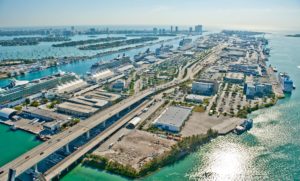How Florida is and may fare under different practices

Port Miami Container Terminal. Courtesy, Port Miami
With Florida geographically at the crossroads of key Latin and South American trades routes, it’s not surprising to learn from a new study that about one out of five jobs in Florida is dependent on international trade. New trade agreements, together with measures to reduce regulation on business and on individual professions in Florida, are part of this week’s look at economic news of interest.
The new study by the Business Roundtable has lots of Florida goodies. It shows that international trade supports almost 2.4 million jobs in Florida. Our trade with neighbors Canada and Mexico account for about 750,000 of those jobs, the Roundtable noted, supporting the need to preserve those relationships, now through the United States-Mexico-Canada Agreement (USMCA), which replaced NAFTA.
Exports make up almost 10% of the Sunshine State’s Gross Domestic Product. Florida exported $52.9 billion in goods and $43.3 billion in services in 2017, according to the study, with 95% of our exporters comprised of small- and medium-sized companies of less than 500 employees.
In February, the Governor and the state’s licensing boards held a “Deregathon” to gather ideas about regulations and professional licensing requirements that may do more harm than good to the economy. The result are bills making their way through the legislature that would deregulate a number of professions.
SB 1640 and HB 27 would reduce or eliminate licensing requirements on a variety of professions in Florida, including interior designers, which currently require six years of combined education and experience before a candidate can sit for the licensing exam. Other professions being considered for elimination of licensing include auctioneers and talent agents. A myriad of other professions would see licensing requirements reduced. Of interest to the insurance industry, these include architects, building code inspectors, home inspectors, electrical contractors, engineers, and mold remediators.
Florida’s rapid growth over the years has been fueled not only by human capital, but by the availability of land to build on – especially in those areas of the state that are rather swampy. Given the finite amount of land available, the legislature decades ago allowed the use of “mitigation banks.” It allowed developers to build on wetlands, so long as they purchased wetland credits to fund wetland restoration or cleanup in a different location – sometimes hundreds of miles away.
Now those mitigation banks are running out of land themselves, especially in more populous South Florida. Bills before the legislature (SB 532 and HB 521) would allow local governments to start offering wetland mitigation credits to restore public lands. Supporters say moving mitigation from the private to the public sector will keep land available for more development to support Florida’s rapid population growth. Critics point to studies which show it hasn’t been effective in preserving the net sum total nor the type of wetlands necessary to filter and store water.
LMA Newsletter of 4-8-19

